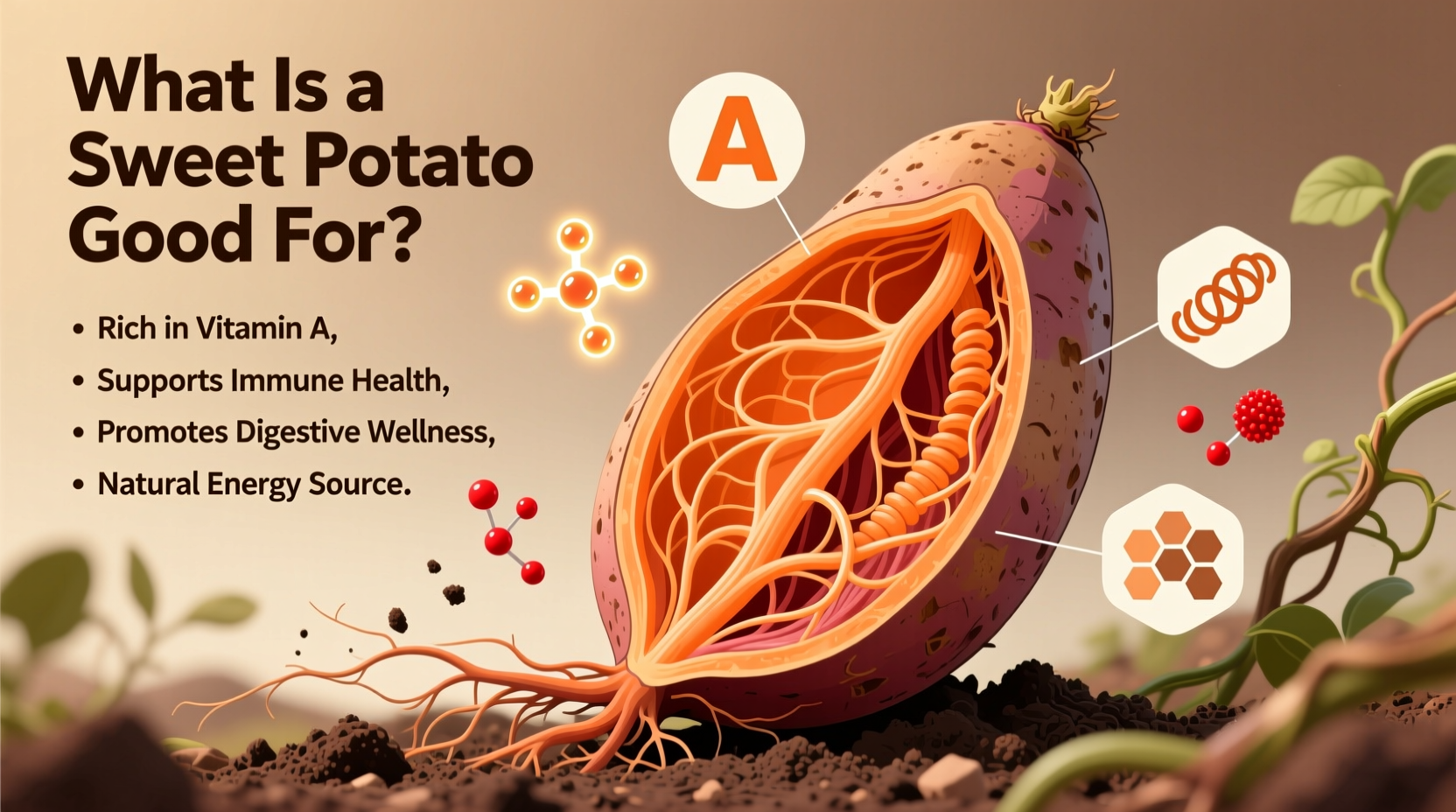Unlock the Power of Sweet Potatoes: Your Complete Nutritional Guide
When you're wondering what is a sweet potato good for, the answer spans multiple dimensions of health and wellness. This vibrant root vegetable isn't just a tasty side dish—it's a nutritional powerhouse that delivers measurable health benefits backed by scientific research. Understanding exactly what sweet potatoes are good for can transform how you approach meal planning and long-term wellness strategies.
Why Sweet Potatoes Deserve a Permanent Spot on Your Plate
Unlike many trendy superfoods that come and go, sweet potatoes have sustained their nutritional reputation for good reason. Their unique combination of complex carbohydrates, dietary fiber, and phytonutrients creates a synergistic effect that supports multiple body systems simultaneously. Research from the National Institutes of Health confirms that regular consumption of sweet potatoes correlates with improved metabolic markers and reduced inflammation.
What makes sweet potatoes particularly valuable is their glycemic response profile. Despite their natural sweetness, they have a lower glycemic index than white potatoes, making them a smarter carbohydrate choice for blood sugar management—a crucial consideration for the 37 million Americans with diabetes.
| Nutrient | Sweet Potato (100g) | White Potato (100g) | Health Benefit |
|---|---|---|---|
| Vitamin A (RAE) | 709 μg (79% DV) | 0 μg | Immune function, vision health |
| Vitamin C | 2.4 mg (3% DV) | 19.7 mg (22% DV) | Antioxidant protection, collagen synthesis |
| Potassium | 337 mg (7% DV) | 421 mg (9% DV) | Blood pressure regulation, muscle function |
| Dietary Fiber | 3 g (11% DV) | 2.2 g (8% DV) | Digestive health, satiety |
| Glycemic Index | 44-61 | 72-85 | Blood sugar management |
Data source: USDA FoodData Central
Top 5 Evidence-Based Health Benefits of Sweet Potatoes
1. Vision Protection Through Vitamin A Power
One medium sweet potato contains more than 400% of your daily vitamin A requirement in the form of beta-carotene. This potent antioxidant converts to retinol in your body, which is essential for maintaining healthy vision. According to research published in the American Journal of Clinical Nutrition, populations with higher beta-carotene intake show significantly lower rates of age-related macular degeneration—the leading cause of vision loss in older adults.
2. Blood Sugar Regulation for Metabolic Health
Despite their sweet taste, sweet potatoes have demonstrated impressive blood sugar management properties. A study in the Journal of Medicinal Food found that purple sweet potato extract improved insulin sensitivity in participants with type 2 diabetes. The key lies in their high fiber content and complex carbohydrate structure, which slows glucose absorption compared to refined carbohydrates.
3. Immune System Support During Cold and Flu Season
The vitamin C and beta-carotene combination in sweet potatoes creates a powerful immune-boosting effect. Vitamin A maintains the integrity of mucosal barriers in your respiratory and digestive tracts—the body's first line of defense against pathogens. During the winter months, incorporating sweet potatoes into your diet provides natural immune support without relying on supplements.
4. Digestive Health Through Prebiotic Fiber
Sweet potatoes contain both soluble and insoluble fiber, making them excellent for digestive health. The soluble fiber forms a gel-like substance that slows digestion and feeds beneficial gut bacteria, while insoluble fiber adds bulk to stool and prevents constipation. This dual-action fiber profile makes sweet potatoes particularly valuable for maintaining a healthy gut microbiome—a factor increasingly linked to overall health and disease prevention.
5. Anti-Inflammatory Properties for Chronic Disease Prevention
The vibrant orange color of sweet potatoes comes from anthocyanins and other phytochemicals with potent anti-inflammatory effects. Chronic inflammation is now recognized as a root cause of many serious health conditions including heart disease, arthritis, and certain cancers. Regular consumption of sweet potatoes helps combat this silent threat through natural compounds that modulate inflammatory pathways in the body.

When Sweet Potatoes Might Not Be Ideal: Contextual Considerations
While sweet potatoes offer numerous health benefits, certain medical conditions require mindful consumption. Individuals managing kidney disease with potassium restrictions should monitor their intake, as sweet potatoes contain significant potassium (approximately 542mg per medium potato). Those following extremely low-carb diets for medical reasons may need to limit portions, though sweet potatoes remain a superior carbohydrate choice compared to refined alternatives.
Interestingly, the cooking method dramatically affects sweet potatoes' nutritional profile. Boiling preserves more beta-carotene than baking, while microwaving retains the highest vitamin C content. For maximum nutrient absorption, pair sweet potatoes with a small amount of healthy fat like olive oil or avocado, as this enhances the uptake of fat-soluble vitamins.
Practical Ways to Incorporate Sweet Potatoes Into Your Daily Routine
Understanding what sweet potatoes are good for is only valuable if you can easily integrate them into your lifestyle. Here are three simple, evidence-based strategies:
- Morning metabolism boost: Replace your breakfast toast with roasted sweet potato slices topped with almond butter and cinnamon for sustained energy throughout your morning
- Lunchtime blood sugar balance: Add cubed sweet potatoes to your salad for lunch—they'll help stabilize blood sugar better than croutons or refined carbohydrates
- Evening recovery meal: Pair baked sweet potato with lean protein for dinner to support muscle recovery and improve sleep quality through their natural magnesium content
For those exploring what is sweet potato good for weight loss, their high fiber content promotes satiety while providing essential nutrients often missing in restrictive diets. A medium sweet potato contains only about 100 calories but delivers substantial nutritional value that supports healthy metabolism.
Choosing the Right Variety for Your Health Goals
Not all sweet potatoes offer identical benefits. Understanding the differences helps you maximize specific health outcomes:
- Orange-fleshed varieties: Highest in beta-carotene, ideal for vision health and immune support
- Purple-fleshed varieties: Rich in anthocyanins, offering superior antioxidant and anti-inflammatory benefits
- White-fleshed varieties: Lower in sugar content, better for strict blood sugar management
When shopping, select firm sweet potatoes without soft spots or bruises. Store them in a cool, dark place (not the refrigerator) where they'll maintain freshness for 3-5 weeks. Contrary to popular belief, sweet potatoes don't need refrigeration and actually develop better flavor when stored at room temperature for a few days after purchase.
Addressing Common Sweet Potato Misconceptions
Many people wonder are sweet potatoes good for diabetics—the answer is yes, with proper portion control. Their lower glycemic index compared to white potatoes makes them a diabetes-friendly carbohydrate option. The American Diabetes Association specifically recommends sweet potatoes as a smart carb choice for blood sugar management.
Another frequent question is are sweet potatoes good for weight loss. While no single food causes weight loss, sweet potatoes' nutrient density and satiety-promoting properties make them valuable in weight management plans. Their natural sweetness can also help reduce cravings for less healthy sugary treats.











 浙公网安备
33010002000092号
浙公网安备
33010002000092号 浙B2-20120091-4
浙B2-20120091-4